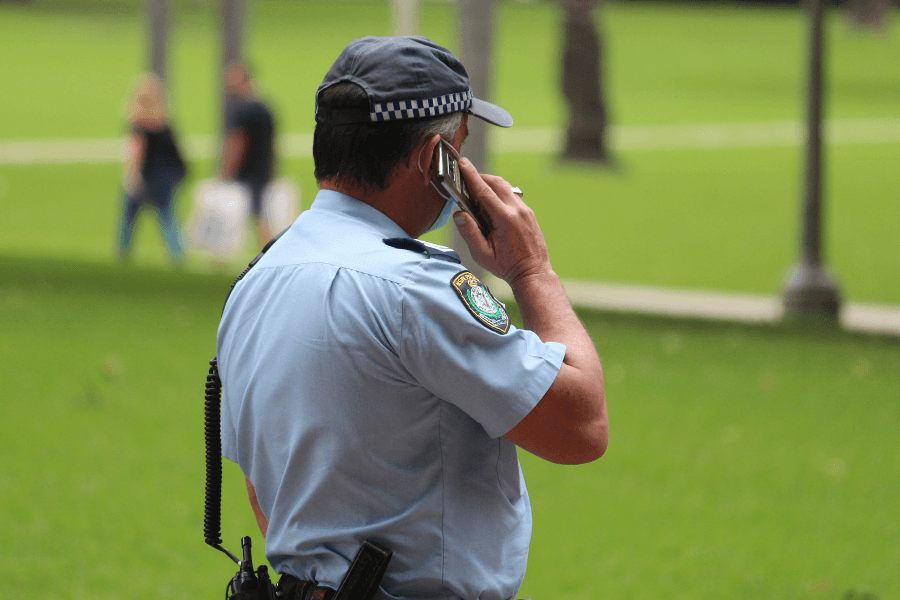A producer for the YouTube comedian Friendlyjordies, who’s being sued by NSW Deputy Premier John Barilaro for defamation, has been charged with allegedly stalking and intimidating the MP.
The NSW Police Fixated Persons Unit arrested Kristo Langker at his family home in Dulwich Hill. They took him to Newtown Police Station and charged him with two counts of stalk or intimidate intending to cause fear of physical or mental harm.
The Fixated Persons Unit

NSW Police created the Fixated Persons Unit (FPU) in May 2017, in response to lone actors such as the man responsible for the Lindt siege.
NSW Commissioner of Police Mick Fuller said the unit would focus on non-terrorist suspects who threaten public officials. The unit is also involved in proactively locating people who are vulnerable to this type of behaviour. However, this type of pre-emptive crime division can be concerning.
A similar type of pre-emptive crime unit was established as the Suspect Target Management Plan (STMP). This is a secret black-list of people who are likely to commit a crime. This list has been known to target children, Indigenous people and people in low-socio economic areas.
Barilaro complaint tipped off the FPU
The FPU was acting on a complaint from the Deputy Premier when it arrested the producer.
Tensions between the YouTuber and the MP have dramatically risen, with the MP suing the YouTuber for defamation in the Federal Court.
The videos accused Barilaro of corruption, and the MP has stated the videos are “vile and racist”.

Lawyers for the arrested producer criticised the arrest, stating the use of the FPU was “shocking”.
They also alleged Langker’s mother was assaulted during the arrest. Additionally, they criticised “utterly extreme” bail conditions prohibiting their client from possessing images or caricatures of Barilaro, or commenting on his “personal appearance or behaviour”.
Police have also taken out an apprehended violence order (AVO) against the producer on behalf of Barilaro.
“The behaviour of the accused, friendly jordies and the public reach of the friendly jordies media platform has caused the victim to be constantly anxious and in fear of his and his families [sic],” police said in a statement of facts.
“Due to the public reach and offensive nature of the friendly jordies media platform, the victim in his public position is harassed by the followers of Friendly Jordies.”
Accusations of hiding evidence and police assault
Footage from the arrest, as reported by The Guardian show the producer handing his phone to his mum before police state, “They’re giving away evidence and trying to run away with it. Don’t run off with evidence, OK?”
A woman’s voice is then heard saying: “You hurt a 51-year-old woman. You knocked me over.”
The police officer says he “tripped over”, prompting the woman to respond: “No you didn’t. You pushed me down. You assaulted me. You assaulted me.”
The officer says: “No I didn’t. We told you to hand over the phone, you handed it to her. I tripped over you, that’s what happened.”
In this exchange, the officer is alleging the the producer’s mother tried to hand the phone to his sister.
Police powers to take your phone upon arrest
Under section 49 of LEPRA, the police can seize and detain your phone or smart device, under a valid warrant. The police can do this if the person executing the search warrant has reasonable grounds to believe the phone or smart device is connected with any offence.
Section 28A of LEPRA relate to someone who has already been arrested. Section 28A allows police to search a person in lawful custody after their arrest and seize anything they have on them. This must be carried out at a police station, a place of detention, or immediately before or during transportation to one of these places.
Police also have the power to take an item from a non-suspect where they have reasonable suspicion a serious crime has been committed and the item is the fruit of that crime, was used in it or is evidence of it.
In the 2017 NSW Local Court case of Police v Ronald Sines; Police v Andrew Love, Magistrate Vivian Swain found that police had the power to seize the phone of Mr Love. He had been filming officers arresting Mr Sines. According to the decision, police were entitled to seize the phone as it contained evidence of an assault of an officer.
However, under federal law, forcing an individual to disclose his or her password, personal identification number or private encryption keys to enable access to a smartphone or a computer requires a warrant.






